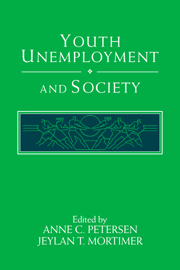Book contents
- Frontmatter
- Contents
- Contributors
- Foreword
- Introduction
- I INVESTMENT IN YOUTH
- 1 Youth, unemployment and marginality: The problem and the solution
- 2 Social capital, human capital, and investment in youth
- 3 When may social capital influence children's school performance?
- Reply to John Modell
- Reply to James S. Coleman
- II MACROSOCIAL PERSPECTIVES
- III INDIVIDUAL PERSPECTIVES
- IV SOCIAL CONSEQUENCES AND INTERVENTIONS
- V IMPLICATIONS FOR RESEARCH
- Index
Reply to John Modell
Published online by Cambridge University Press: 05 May 2010
- Frontmatter
- Contents
- Contributors
- Foreword
- Introduction
- I INVESTMENT IN YOUTH
- 1 Youth, unemployment and marginality: The problem and the solution
- 2 Social capital, human capital, and investment in youth
- 3 When may social capital influence children's school performance?
- Reply to John Modell
- Reply to James S. Coleman
- II MACROSOCIAL PERSPECTIVES
- III INDIVIDUAL PERSPECTIVES
- IV SOCIAL CONSEQUENCES AND INTERVENTIONS
- V IMPLICATIONS FOR RESEARCH
- Index
Summary
John Modell's chapter in this volume argues that there has not been a decline in social capital provided by the family for schoolchildren in the United States, and that the social capital U.S. parents provide for their children is higher than that in many other countries. This, of course, goes directly against the arguments of my chapter, so it is useful to add a word about the divergence. First a correction to Modell's contention that the decline in test scores has been “more than overcome.” The decline in SAT test scores has stabilized in mathematics, but remains 20 points below its pre-decline (1952–1963) level, whereas the verbal score has continued to decline—in 1991, it was 50 points below the pre-decline level (Murray & Herrnstein, 1992). Furthermore, the decline has been particularly great at the upper end of the distribution, implying that the decline is not merely compositional, or due to an influx at the lower end of the distribution.
Another point about the relative decline in mathematics and verbal skills suggests the loss of social capital in the family, rather than merely decreased effectiveness of the school. Extensive evidence indicates that a greater portion of mathematics than of verbal skills learned is learned in school (Coleman, 1993). Crudely put, mathematics is learned in school, verbal skills at home. The greater decline in verbal skills versus mathematics indicates a greater decline in the family's educational strength rather than in that of the school.
- Type
- Chapter
- Information
- Youth Unemployment and Society , pp. 69 - 71Publisher: Cambridge University PressPrint publication year: 1994



